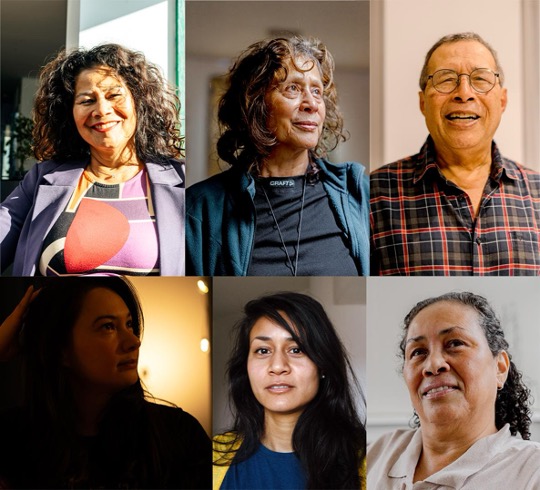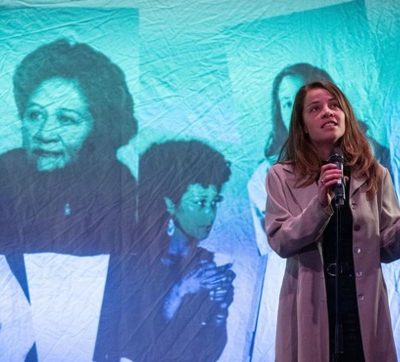Details
Article
The past is like the present and the future, far from rigid. It is ever-changing and always moving depending on the perspective of the narrator. In school I was taught about history in a standardized and fixed way, learning so-called key moments and key figures. Which moments and figures do we consider key when learning about history?
To me it wasn’t Jan Pieterszoon Coen (1587-1629), nor Witte de With (1599-1658). However, both were referred to as important historical figures in the history books in high school – the so-called “explorers.” There are street names named after them in several cities. I wouldn’t call De With’s burning 90,000 clove trees belonging to Moluccan farmers, because they did not accept the authority of the VOC, is exploring. Neither seeing Pietserszoon Coen as an exemplary military leader, being responsible for approximately 15,000 murders of inhabitants of the Banda Islands, in present-day Indonesia, because they did not recognise the VOC’s nutmeg monopoly.
It amazes me how little Dutch people know why we eat stamppot met nootmuskaat (mashed potatoes with nut meg) or peanut butter with sambal, and that a price has been paid for it. Today, we are still paying the price of colonisation. I see it in the eyes of my aunts, I hear it in the left silence of my grandparents, I notice it in the behaviour of my cousins.

“I’m Dutch with a colour,” my mother says.
I can see her brown skin. As a child I noticed that there weren’t many people around us who looked like my mother. I remember my eldest aunt using an umbrella against the sun. We never talked about where we come from, but as I got older I became more curious about our roots.
bow your head
act white
become white
work hard
become a lawyer or a doctor
and make sure you never
depend on someone else
the two steps you are already behind
as a woman and immigrant
set the tone for you and
you have to sing that song
to belong
even if you “don’t belong here”
You can’t see it on my pale face, but you can hear in my voice how I speak the language of intergenerational trauma. Trauma can leave a chemical scar on human genes, one that passes from one generation to the next. Diving into our family tree and understanding our family’s history can shed light on why our bodies behave as they do, why they present certain physical distinct features, and why certain diseases manifest. Epigenetic scientists are still on the path to discovering why memories live on in future generations and how.
This is why I argue that you should ask your family questions about the past. To learn more about yourself, about your family and about each other. I want to learn about my family’s (his)stories. We are made up stories, it forms the human fabric. But some stories stay hidden, are repressed or simply lost. I don’t want that for my family.
My family is part of Dutch colonial history. I always call my mother a colonial product, being born to a Surinamese father and Moluccan mother – both Suriname and Indonesia were colonized by The Netherlands for over 300 years.
my roots go back to the lines in my hands
traces of both the coloniser and colonised
I don’t want to talk in sides
no perpetrator and victim
history is always contradicting
pieces are always missing
I’m done restricting myself
to histories inflicted upon me
self-realisation
acceptation
determination
I no longer want to turn back time
this family of mine
is learning to be soft
being human
in cooking nasi goreng
soup with rice
no disguise
nootmuskaat en kruidnagel
that’s where we come from
 So, the past months I sat down with some family members. I asked them all the same questions, because I wanted to know their perspectives on certain subjects. We talked about the story of my grandparents, our ancestral history, their upbringing, their identity and their hopes for Surinamese and Moluccan diaspora. More and more I understand why my family is the way they are. It’s painful, but I find it more painful not to talk about our family’s story at all.
So, the past months I sat down with some family members. I asked them all the same questions, because I wanted to know their perspectives on certain subjects. We talked about the story of my grandparents, our ancestral history, their upbringing, their identity and their hopes for Surinamese and Moluccan diaspora. More and more I understand why my family is the way they are. It’s painful, but I find it more painful not to talk about our family’s story at all.
—
You can learn more about my story in my upcoming spoken word EP. I translated my family’s interviews into spoken word pieces and brought together soundbites from the heartfelt and raw conversations, I was blessed to have with family members.


